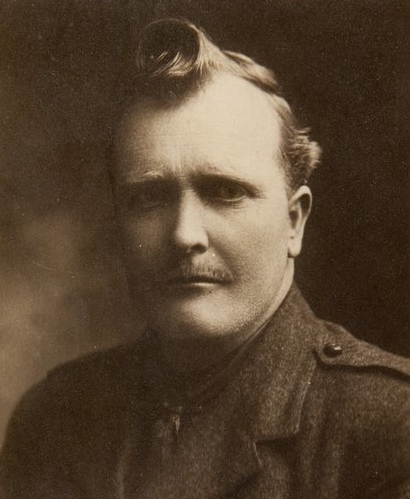Seán Hales killed en route to Dáil as attacks on politicians’ homes increase
Dublin, 19 December 1922 – Brigadier-General Seán Hales, TD for Cork County, has been shot dead on the streets of Dublin while making his way to the Dáil. Another TD, Pádraic Ó Máille, who is deputy speaker of the Dáil, was seriously wounded in the same attack.
The attack on the two TDs occurred in broad daylight on 7 December. Hales and Ó Máille were leaving the Ormond Hotel and preparing to get into a hackney car to attend a session of the Dáil when a party of armed men unleashed a volley of shots in their direction from close range.
Brigadier Hales – a brother of Tom Hales, senior anti-treaty officer who was recently captured by National Army troops near Bandon – is reported to have sustained eight wounds to his head and body in the attack and was pronounced dead one minute after his admission to Jervis Street hospital.
Mr Ó Máille, who was struck by two bullets, arrived conscious at the same hospital and is in a stable condition.
A report on the incident issued by Army Headquarters at Portobello Barracks noted the two TDs’ active service in the recent Anglo-Irish war, Seán Hales with the flying columns in west Cork, and Pádraic Ó Máille with the flying columns in Galway and Connemara.
Hales, a friend of the late Michael Collins, had been arrested near Bandon in 1916 and served nine months in prison, after which he helped build up the Volunteer force in south and west Cork. Hales was later associated with some of the major engagements in the region including those at Rosscarbery, Upton, Kilmichael, Crossbarry and Innishannon.
News of the Dublin shootings were conveyed to a shocked Dáil by President Cosgrave:
‘I have just been informed that Deputy Sean Hales has been shot dead and that Deputy Pádraic Ó Máille has been wounded. I just got information a few moments ago and I give it to the Dáil now officially. I need hardly say, on my own behalf, on behalf of the executive council, and, I believe, on behalf of the Dáil, that this is an appalling tragedy. We tender to the relatives of the late Deputy Sean Hales our very sincere sympathy, and our regret that such a crime as that should have been committed in this country.’
A solemn Requiem High Mass will be celebrated today for the late Brigade-General Hales at the Pro-Cathedral on Dublin’s Marlborough Street. His remains will then be taken to Cork by boat where his funeral mass will be presided over by Daniel Cohalan, Bishop of Cork.
British Pathé footage from 1922 of late Brigadier Sean Hales
The attack on deputies Hales and Ó Máille comes at a time when raids on the private homes of elected representatives is becoming increasingly commonplace. The houses of Seán McGarry, J.J. Walsh and Mícheál MacDonnchadha have recently been a target of violence, as has Jennie Wyse Power’s shop .
Earlier this month, in a letter sent to the Michael Hayes, the Speaker of the Dáil, by Liam Lynch, Chief of the Staff of the Irregular army, who claimed that the parliament was an ‘illegal body’ which had ‘declared war on the soldiers of the republic and suppressed the legitimate parliament of the Irish nation’.
Mr Lynch noted that anti-treaty prisoners had been treated ‘barbarously’ and were now being executed after trials in ‘make-believe courts’.
In a less than veiled threat to the Dáil deputies, Liam Lynch stated:
‘Next to the members of your provisional government every member of your body who voted for this resolution by which you pretend make legal the murder of soldiers is equally guilty. We, therefore, give you and each member of your body due notice that unless your army recognises the rules of warfare in the future we shall adopt very drastic measures to protect our forces.’
[Editor's note: This is an article from Century Ireland, a fortnightly online newspaper, written from the perspective of a journalist 100 years ago, based on news reports of the time.]





















